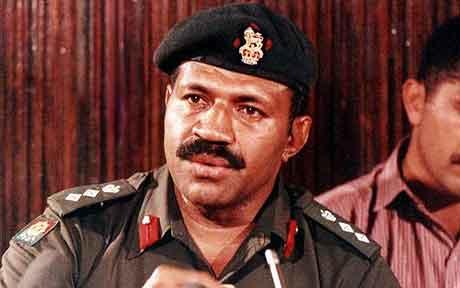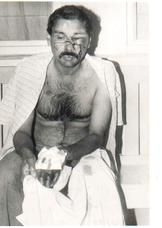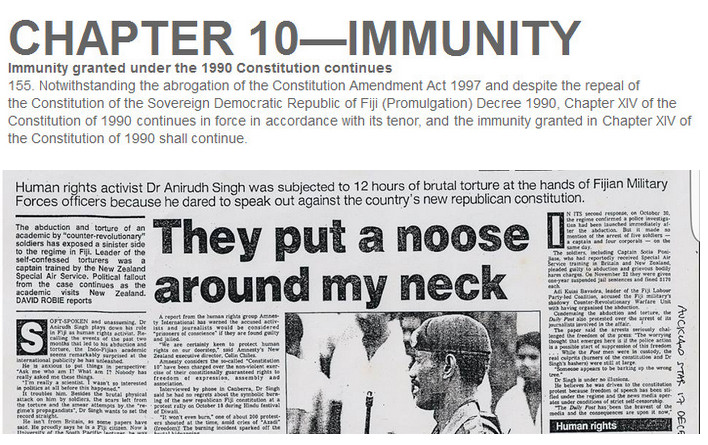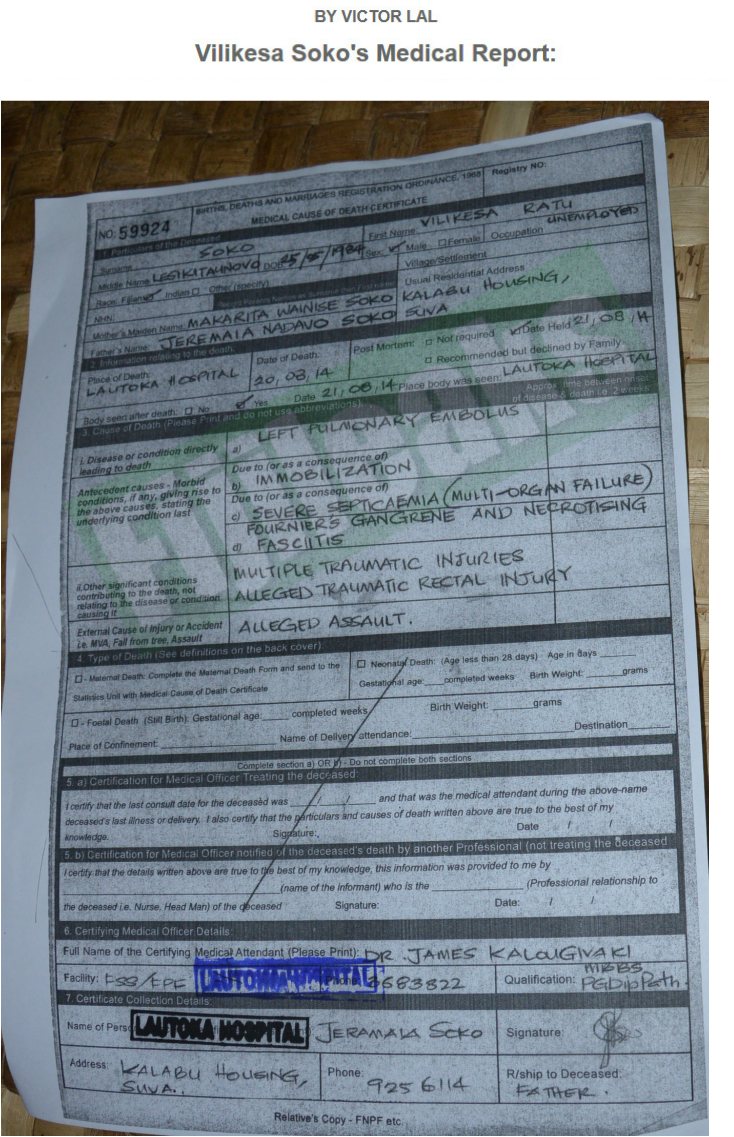
Monday 5 Dec 2016 10:19 a.m.
Fiji man Vilikesa Soko was suspected of robbery, but never got a chance to defend himself in court - he was beaten and raped in custody by officers and later died. The 30-year-old father-of-three's case was one of several documented in a graphic Amnesty International report documenting the routine use of torture in the Pacific island nation.
The 'Beating Justice: How Fiji's Security Forces Get Away with Torture' report, released on Monday, says there's an "ingrained culture of torture" in the Pacific holiday hotspot, with the military in charge of key institutions since the 2006 coup.
Amnesty is calling for that to end, and for members of the military to be held accountable under the law. The report says beatings are the most common form of torture, with five reported cases where people were beaten to death while in custody. It details the use of threats to intimidate people and coerce confessions.
There are also accounts of routine violence against those suspected of crime, including beatings, rape, sexual violence, attacks by police dogs and shootings. Mr Soko died in August 2014, four days after being beaten. He'd developed a blood clot in one of his lungs, a result of the traumatic injuries he received.
The details of his death were made public after an autopsy report was leaked online (Fijileaks: http://www.fijileaks.com/home/brutal-proof-here-is-the-evidence-of-rear-admiral-voreqe-bainimarama-and-his-lawmaker-khaiyums-police-brutality-yes-robbery-suspect-soko-as-revealed-by-fijileaks-was-abused-and-killed-by-regime-police-thugs)
"Torture does not just humiliate the victim. It also debases the torturer by hollowing out their humanity," said Kate Schuetze, Amnesty International's pacific researcher.
"Not only do the security forces know that torture is taking place, they have stood in the way of accountability. While the Fijian authorities have ratified the UN Convention Against Torture and pledged to end this cruel practice, it will remain an empty gesture until decisive action is taken."
In January 2007, two people died after being beaten by military officers - those responsible were released within a month of being sentenced to four-year terms.
The report also documents a case of five men, accused of robbing a Nadi shop, having crushed chilies rubbed on their bodies, water poured in their ears and rocks dropped on their backs. They were beaten until they confessed.
Lawyers of torture survivors have also been targets of violence.
Amnesty says Prime Minister Frank Bainimarama condones the behaviour and the "climate of near-impunity", where officials don't face justice for human rights violations.
Torture details are often suppressed by authorities, but videos and autopsy reports are later leaked online
"In the face of these reports, the government has not only refused to condemn the torture that took place, but in some cases have offered the security officials its unequivocal support," the report says.
Amnesty International report: 'Beating Justice: How Fiji's Security Forces Get Away with Torture' by NewshubNZ on Scribd
See also in PDF form, below:
“Every time we shrug when we hear of another midnight raid, the cries of terrorized women and children, then somewhere in Fiji another potential [Klaus] Barbie [The Nazi Butcher of Lyon in France] is getting a start in life,” said the former Methodist communications secretary in 1987, the Reverend Akuila Yabaki
As Minister for Internal Security, Mr Rabuka had extraordinary range of powers, which violated international standards of human rights, including the detention of any person for two years; order restriction of movement, freedom of expression, employment, residence or activity; prohibit the printing, publication, sale, issue, circulation or possession of any written material, and prohibit its communication through word of mouth etc. And yet Mr Rabuka was free to publish his book “No Other Way”. But no criticism of his book was permitted, and one USP Indo-Fijian lecturer who dared to criticise it, was detained and severely beaten up. - VICTOR LAL

Rabuka’s 1987 terror regime: A WARNING
By VICTOR LAL
29 December 2006
“Every time we shrug when we hear of another midnight raid, the cries of terrorized women and children, then somewhere in Fiji another potential [Klaus] Barbie [The Nazi Butcher of Lyon in France] is getting a start in life,” said the former Methodist communications secretary in 1987, the Reverend Akuila Yabaki, now head of the Citizens Constitutional Forum.
He was speaking out against the reign of terror and torture practised mostly against the Indo-Fijian community by Sitiveni Rabuka, his military henchmen, prominent chiefs, and the dreaded and racist Fijian taukei foot soldiers following the 1987 coups.
Now, nearly twenty years later, we are beginning to hear the first ripples of ‘torture tactics’ by the military against the pro-democracy supporters. But let us hope and pray that Commodore Frank Bainimarama’s military will not go down the road that Mr Rabuka took his troops, chiefs, and taukeists like Apisai Tora to achieve his objective of ‘Fiji for the taukei Fijians’.
The first casualty was the media when Mr Rabuka launched his coup on 14 May 1987. In an editorial on 15 May, the old Fiji Sun asked: “What right has a third-ranking officer to attack the scared institutions of Parliament? To presume he knows how best this country shall be governed for the good of all? The answer is: NONE. The people must decide their own future: not self-promoting dictators and not a Council appointed by and presided over by Lieutenant-Colonel Rabuka. But was he encouraged by others to act? And if so, who were they?”
We now know who they were, and many of those are still around, in positions of influence and authority. Most of them were prominent paramount chiefs, civil servants, church leaders, lawyers, magistrates, judges, and fallen politicians. They were indigenous Fijians, some of whom, and their offspring, are today hiding from the military in a great game of hide and seek following the 5 December coup. The former governor-general and Mr Rabuka’s paramount chief Ratu Sir Penaia Ganilau, made it easier for Mr Rabuka to crush civil disobedience by warning that the civilian-cum military regime would not hesitate to use emergency powers it had under martial law.
On 15 May 1987, shortly after the Fiji Sun editorial, the Ministry of Information directed the Fiji Times and Fiji Sun to cease publication. The RFMF occupied Radio Fiji. The same day armed soldiers’ ejected staff of both the two newspapers from their offices, and foreign journalists were questioned by the RFMF. In a sickening spectacle, the raid on the Times office was led by one of its own reporters and army reservist E.T. Volavola in full combat gear carrying a rifle and backed up by a squad of troops.
Mr Rabuka announced a Council of Ministers (COM), which was dominated by ex-Alliance Party Ministers (including Ratu Mara who had lost the election to Dr Timoci Bavadra). Mr Rabuka said his military regime was in full control and the people had accepted the coup, and called on the international community to recognize his regime. He said he had abrogated the Constitution and the regime would govern Fiji by decree. He brushed aside the demands of the Council of Churches “in the name of Christianity” to release the MPs he had kidnapped and was holding as hostages, and “surrender to the sovereign authority of the land”, and restore “our duly elected government”.
He instead moved into deposed Prime Minister Dr Bavadra’s office. But when the Fiji Sun questioned Mr Rabuka’s right to occupy high office, he threw the general manager and one of the directors, who was also President of the Fiji Law Society, in the same prison cell as that occupied by Dr Bavadra. The Sun was singled out for severe maltreatment. Sadly, most of the harassment and intimidation was carried out against the Indo-Fijian journalists, for after all, Mr Rabuka had executed the coup to give Fijians the control of Fiji.
Some Fijian journalists, therefore, switched sides, and became Mr Rabuka’s propagandists, reporting on their Indo-Fijian colleagues and their families. In the end, the Fiji Times agreed to operate under partial military censorship, while the old Fiji Sun was forced to cease operations in the country after it published allegations that Mr Rabuka had bought a house in Suva favoured by wealthy Indo-Fijians and expatriates, on a 100% mortgage from a prominent Alliance politician. In the end, some of Fiji’s best Indo-Fijian journalists were forced to emigrate or seek political asylum abroad. Some of us were not only on Mr Rabuka’s hit list but even had our passports confiscated, ending up overnight from being citizens to wandering international refugees.
The next group that Mr Rabuka and his cronies targeted were his political opponents. Shortly before the coup the taukeists firebombed the law offices of Jai Ram Reddy, now an International Criminal Court judge. The late Sir Vijay Singh was detained and his passport seized, prompting him to ask: “What kind of normalcy is [Ganilau] thinking about when things like this happen.”
Dr Bavadra’s spokesman and current Suva lawyer Richard Naidu was arrested and detained on different occasions. He was chased and beaten up by Taukeists, and finally had his Fiji nationality revoked, and ordered to leave the country for New Zealand. Another legal adviser of Dr Bavadra, John Cameron, had his work permit withdrawn after he filed civil suit against dissolution of Parliament, and had also filed claim with the Supreme Court on behalf of a client harassed by the RFMF, seeking a declaration that State of Emergency and 1987 Emergency Regulations were unconstitutional.
Among judges arrested included Justices Kishore Govind and Rooney, including Chief Magistrate Howard Morrison. Even the Police Commissioner, an Indo-Fijian Pramesh Raman, whose job Mr Rabuka had applied a week before the coup, was taken into custody. Several Indo-Fijian lawyers and academics were also taken into custody, mostly on legal advice of some Fijian lawyers.
Although the vast majority of victims were Indo-Fijians, some prominent Fijians like Amelia Rokotuivanua and Dr Steven Ratuva came in for rough treatment. The two were “lectured” by Lieutenant Pio Wong on how to be “true Fijians” and Dr Ratuva had spells in detention, and at one point the military allegedly tried to poison him with the prepared food it had brought to his house. In 1986 he had claimed in a paper that the RFMF’s only function lay in internal repression or as a conduit for chiefly advancement. He had also suggested that “intermarriages between the sons and daughters of chiefs (including the chiefly officers in the army) helps to consolidate the chiefly comprador clique which ensures the perpetuation of nepotism and inequality in Fijian society”.
On 25 September Mr Rabuka carried out his second coup. Violence and intimidation was encouraged, and a group of escaped prisoners were escorted by the military to march to the Government House to demand pardons. When the GCC refused to recognise Mr Rabuka as president, he declared Fiji a republic, declared himself the head of state and no longer recognised the GCC as such. However, on 5 December he agreed to hand over power to the new President Ratu Penaia and the Prime Minister Ratu Mara. Mr Rabuka took charge of Home Affairs, the CJ returned to the bench, Sailosi Kepa was recalled as High Commissioner from London to take over as Minister for Justice and A-G, and Berenado Vunibobo became Minister of Trade and Commerce. Dr Bavadra retorted: “It is a military government in a civilian cloak.”
The international community resumed trade and diplomatic links with Fiji. Australia conferred Mr Rabuka legitimacy by announcing that it was recognizing Fiji as a state rather than the government of Fiji. Ratu Penaia granted Mr Rabuka and his close circle of oppressors, questionable amnesty, and the Fijians introduced apartheid against the Indo-Fijians. Ratu Penaia also formally signed new Internal Security Decree, giving army power to shoot to kill anyone found with illegal arms that resisted arrests.
As Minister for Internal Security, Mr Rabuka had extraordinary range of powers, which violated international standards of human rights, including the detention of any person for two years; order restriction of movement, freedom of expression, employment, residence or activity; prohibit the printing, publication, sale, issue, circulation or possession of any written material, and prohibit its communication through word of mouth etc.
And yet Mr Rabuka was free to publish his book “No Other Way”. But no criticism of his book was permitted, and one USP Indo-Fijian lecturer who dared to criticise it, was detained and severely beaten up. My own critical counter-book Fiji: Coups in Paradise was banished from the bookshelves of Fiji. As Mr Rabuka plunged the economy into a decline, he was offered $50,000 from an Australian publishing company as a retainer for his book and a TV documentary. The RFMF, commenting on brief detentions and harassment said, “Due to the current conditions everyone is suspect until proven innocent”. Mr Rabuka went on to become the Prime Minister and chairman of the Great Council of Chiefs on the bandwagon of nationalist and racist ideology, an ideology which Commodore Bainimarama claims he wants to stamp out once and for all.
If that is so, let us hope that he will not follow in the footsteps of Mr Rabuka, for many of my own family members still bear the scars of Mr Rabuka’s storm troopers on their chests, and so do many other citizens from the 1987 and 2000 coups.
The Indo-Fijians, in 1987, were beaten, forced to stand in sewage pools, and subjected to other forms of humiliating punishments.
The vast majority of Fijians remained silent to the oppression and racism in their midst. In fact, many joined in its continuation for the next ten years. But freedom, as former military strongman Mr Rabuka found out only very recently (after he was successfully defended by the President of the Fiji Law Society, Mr Sharma, on inciting mutiny), is a cherished and inviolable right.
By VICTOR LAL
29 December 2006
“Every time we shrug when we hear of another midnight raid, the cries of terrorized women and children, then somewhere in Fiji another potential [Klaus] Barbie [The Nazi Butcher of Lyon in France] is getting a start in life,” said the former Methodist communications secretary in 1987, the Reverend Akuila Yabaki, now head of the Citizens Constitutional Forum.
He was speaking out against the reign of terror and torture practised mostly against the Indo-Fijian community by Sitiveni Rabuka, his military henchmen, prominent chiefs, and the dreaded and racist Fijian taukei foot soldiers following the 1987 coups.
Now, nearly twenty years later, we are beginning to hear the first ripples of ‘torture tactics’ by the military against the pro-democracy supporters. But let us hope and pray that Commodore Frank Bainimarama’s military will not go down the road that Mr Rabuka took his troops, chiefs, and taukeists like Apisai Tora to achieve his objective of ‘Fiji for the taukei Fijians’.
The first casualty was the media when Mr Rabuka launched his coup on 14 May 1987. In an editorial on 15 May, the old Fiji Sun asked: “What right has a third-ranking officer to attack the scared institutions of Parliament? To presume he knows how best this country shall be governed for the good of all? The answer is: NONE. The people must decide their own future: not self-promoting dictators and not a Council appointed by and presided over by Lieutenant-Colonel Rabuka. But was he encouraged by others to act? And if so, who were they?”
We now know who they were, and many of those are still around, in positions of influence and authority. Most of them were prominent paramount chiefs, civil servants, church leaders, lawyers, magistrates, judges, and fallen politicians. They were indigenous Fijians, some of whom, and their offspring, are today hiding from the military in a great game of hide and seek following the 5 December coup. The former governor-general and Mr Rabuka’s paramount chief Ratu Sir Penaia Ganilau, made it easier for Mr Rabuka to crush civil disobedience by warning that the civilian-cum military regime would not hesitate to use emergency powers it had under martial law.
On 15 May 1987, shortly after the Fiji Sun editorial, the Ministry of Information directed the Fiji Times and Fiji Sun to cease publication. The RFMF occupied Radio Fiji. The same day armed soldiers’ ejected staff of both the two newspapers from their offices, and foreign journalists were questioned by the RFMF. In a sickening spectacle, the raid on the Times office was led by one of its own reporters and army reservist E.T. Volavola in full combat gear carrying a rifle and backed up by a squad of troops.
Mr Rabuka announced a Council of Ministers (COM), which was dominated by ex-Alliance Party Ministers (including Ratu Mara who had lost the election to Dr Timoci Bavadra). Mr Rabuka said his military regime was in full control and the people had accepted the coup, and called on the international community to recognize his regime. He said he had abrogated the Constitution and the regime would govern Fiji by decree. He brushed aside the demands of the Council of Churches “in the name of Christianity” to release the MPs he had kidnapped and was holding as hostages, and “surrender to the sovereign authority of the land”, and restore “our duly elected government”.
He instead moved into deposed Prime Minister Dr Bavadra’s office. But when the Fiji Sun questioned Mr Rabuka’s right to occupy high office, he threw the general manager and one of the directors, who was also President of the Fiji Law Society, in the same prison cell as that occupied by Dr Bavadra. The Sun was singled out for severe maltreatment. Sadly, most of the harassment and intimidation was carried out against the Indo-Fijian journalists, for after all, Mr Rabuka had executed the coup to give Fijians the control of Fiji.
Some Fijian journalists, therefore, switched sides, and became Mr Rabuka’s propagandists, reporting on their Indo-Fijian colleagues and their families. In the end, the Fiji Times agreed to operate under partial military censorship, while the old Fiji Sun was forced to cease operations in the country after it published allegations that Mr Rabuka had bought a house in Suva favoured by wealthy Indo-Fijians and expatriates, on a 100% mortgage from a prominent Alliance politician. In the end, some of Fiji’s best Indo-Fijian journalists were forced to emigrate or seek political asylum abroad. Some of us were not only on Mr Rabuka’s hit list but even had our passports confiscated, ending up overnight from being citizens to wandering international refugees.
The next group that Mr Rabuka and his cronies targeted were his political opponents. Shortly before the coup the taukeists firebombed the law offices of Jai Ram Reddy, now an International Criminal Court judge. The late Sir Vijay Singh was detained and his passport seized, prompting him to ask: “What kind of normalcy is [Ganilau] thinking about when things like this happen.”
Dr Bavadra’s spokesman and current Suva lawyer Richard Naidu was arrested and detained on different occasions. He was chased and beaten up by Taukeists, and finally had his Fiji nationality revoked, and ordered to leave the country for New Zealand. Another legal adviser of Dr Bavadra, John Cameron, had his work permit withdrawn after he filed civil suit against dissolution of Parliament, and had also filed claim with the Supreme Court on behalf of a client harassed by the RFMF, seeking a declaration that State of Emergency and 1987 Emergency Regulations were unconstitutional.
Among judges arrested included Justices Kishore Govind and Rooney, including Chief Magistrate Howard Morrison. Even the Police Commissioner, an Indo-Fijian Pramesh Raman, whose job Mr Rabuka had applied a week before the coup, was taken into custody. Several Indo-Fijian lawyers and academics were also taken into custody, mostly on legal advice of some Fijian lawyers.
Although the vast majority of victims were Indo-Fijians, some prominent Fijians like Amelia Rokotuivanua and Dr Steven Ratuva came in for rough treatment. The two were “lectured” by Lieutenant Pio Wong on how to be “true Fijians” and Dr Ratuva had spells in detention, and at one point the military allegedly tried to poison him with the prepared food it had brought to his house. In 1986 he had claimed in a paper that the RFMF’s only function lay in internal repression or as a conduit for chiefly advancement. He had also suggested that “intermarriages between the sons and daughters of chiefs (including the chiefly officers in the army) helps to consolidate the chiefly comprador clique which ensures the perpetuation of nepotism and inequality in Fijian society”.
On 25 September Mr Rabuka carried out his second coup. Violence and intimidation was encouraged, and a group of escaped prisoners were escorted by the military to march to the Government House to demand pardons. When the GCC refused to recognise Mr Rabuka as president, he declared Fiji a republic, declared himself the head of state and no longer recognised the GCC as such. However, on 5 December he agreed to hand over power to the new President Ratu Penaia and the Prime Minister Ratu Mara. Mr Rabuka took charge of Home Affairs, the CJ returned to the bench, Sailosi Kepa was recalled as High Commissioner from London to take over as Minister for Justice and A-G, and Berenado Vunibobo became Minister of Trade and Commerce. Dr Bavadra retorted: “It is a military government in a civilian cloak.”
The international community resumed trade and diplomatic links with Fiji. Australia conferred Mr Rabuka legitimacy by announcing that it was recognizing Fiji as a state rather than the government of Fiji. Ratu Penaia granted Mr Rabuka and his close circle of oppressors, questionable amnesty, and the Fijians introduced apartheid against the Indo-Fijians. Ratu Penaia also formally signed new Internal Security Decree, giving army power to shoot to kill anyone found with illegal arms that resisted arrests.
As Minister for Internal Security, Mr Rabuka had extraordinary range of powers, which violated international standards of human rights, including the detention of any person for two years; order restriction of movement, freedom of expression, employment, residence or activity; prohibit the printing, publication, sale, issue, circulation or possession of any written material, and prohibit its communication through word of mouth etc.
And yet Mr Rabuka was free to publish his book “No Other Way”. But no criticism of his book was permitted, and one USP Indo-Fijian lecturer who dared to criticise it, was detained and severely beaten up. My own critical counter-book Fiji: Coups in Paradise was banished from the bookshelves of Fiji. As Mr Rabuka plunged the economy into a decline, he was offered $50,000 from an Australian publishing company as a retainer for his book and a TV documentary. The RFMF, commenting on brief detentions and harassment said, “Due to the current conditions everyone is suspect until proven innocent”. Mr Rabuka went on to become the Prime Minister and chairman of the Great Council of Chiefs on the bandwagon of nationalist and racist ideology, an ideology which Commodore Bainimarama claims he wants to stamp out once and for all.
If that is so, let us hope that he will not follow in the footsteps of Mr Rabuka, for many of my own family members still bear the scars of Mr Rabuka’s storm troopers on their chests, and so do many other citizens from the 1987 and 2000 coups.
The Indo-Fijians, in 1987, were beaten, forced to stand in sewage pools, and subjected to other forms of humiliating punishments.
The vast majority of Fijians remained silent to the oppression and racism in their midst. In fact, many joined in its continuation for the next ten years. But freedom, as former military strongman Mr Rabuka found out only very recently (after he was successfully defended by the President of the Fiji Law Society, Mr Sharma, on inciting mutiny), is a cherished and inviolable right.
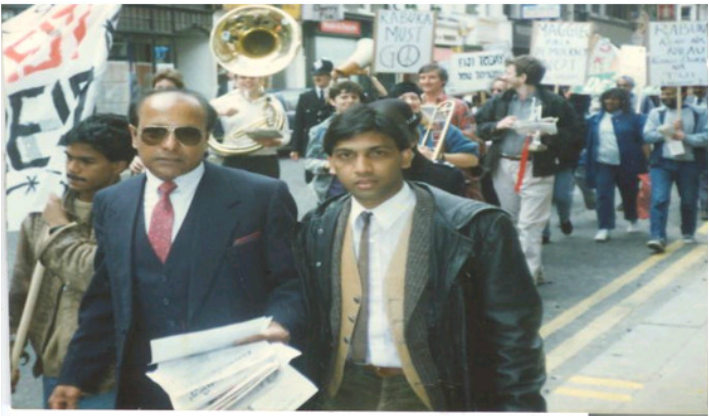
MARCHING AGAINST TORTURE, COUP AND RABUKA'S VIOLENCE: Fijileaks founding editor-in-chief Victor Lal (right) and Mohammed Rafiq Kahan in London. Both were implicated by military dictator Sitiveni Rabuka and his henchmen with plotting to violently overthrow his racist regime by shipping tons of weapons to Fiji. Nelson Mandela: "If I had my time over I would do the same again. So would any man who dares call himself a man." - November 1962. Mitigation speech after being convicted of inciting a strike and leaving the country illegally
